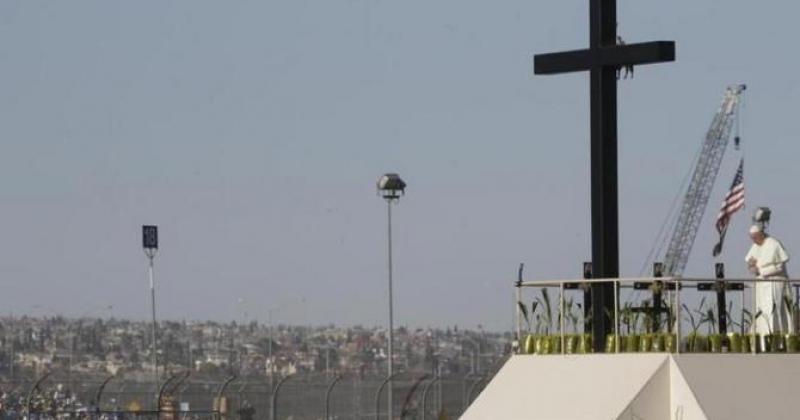Francis celebrates mass at the Area of the Fair in Ciudad Juarez, after praying in silence facing the chain link fence that marks the US-Mexico border: "They are the brothers and sisters of those excluded as a result of poverty and violence, drug trafficking and criminal organizations. Being faced with so many legal vacuums, they get caught up in a web that ensnares and always destroys the poorest. Enslaved, imprisoned and extorted, they are the consequence of a trade in human beings”
First, he prayed in silence before the chain link fence that marks the US-Mexico border. Many on the El Paso side of the fence tried to catch sight of him. El Paso, Texas, faces Ciudad Juarez on the other side of the Rio Grande. After this, the Pope celebrated mass in the Area of the Fair, with the altar less than 90 metres from the border. 230,000 people were present. Another 50,000 people gathered in El Paso’s Sun Bowl stadium to watch the celebration. Pope Francis ends his visit to Mexico in a place that is emblematic of the immigration experience, at that barrier that so many dream of crossing in search of a better future for themselves and for their families.
There are more than 30 million people of Mexican origin living in the US (as compared to the 2 million people of Cuban origin living there). The sums Mexican workers send abroad amount to approximately 3% of US GDP.
Recalling the Bible story of Jonah, who helped the people become aware of their sin, finding men and women who were capable of repenting and of crying, the Pope - who used the pastoral staff he received as a gift from the inmates at the prison he visited earlier in the day - said in his homily: “To weep over injustice, to cry over corruption, to cry over oppression. These are tears that lead to transformation, that soften the heart; they are the tears that purify our gaze and enable us to see the cycle of sin into which very often we have sunk. They are tears that can sensitize our gaze and our attitude hardened and especially dormant in the face of another’s suffering. They are the tears that can break us, capable of opening us to conversion.”
“This word,” he added, “echoes forcefully today among us; this word is the voice crying out in the wilderness, inviting us to conversion. In this Year of Mercy, with you here, I beg for God’s mercy; with you I wish to plead for the gift of tears, the gift of conversion.”
“Here in Ciudad Juarez, as in other border areas,” Francis recalled, “there are thousands of immigrants from Central America and other countries, not forgetting the many Mexicans who also seek to pass over ‘to the other side’. Each step, a journey laden with grave injustices: the enslaved, the imprisoned and extorted; so many of these brothers and sisters of ours are the consequence of a trade in human beings.”
This situation cannot be ignored, we cannot turn a blind eye. “We cannot deny,” Francis said, “the humanitarian crisis which in recent years has meant the migration of thousands of people, whether by train or highway or on foot, crossing hundreds of kilometres through mountains, deserts and inhospitable zones. The human tragedy that is forced migration is a global phenomenon today.”
“This crisis, which can be measured in numbers and statistics, we want instead to measure with names, stories, families,” Francis continued. “They are the brothers and sisters of those excluded as a result of poverty and violence, drug trafficking and criminal organizations. Being faced with so many legal vacuums, they get caught up in a web that ensnares and always destroys the poorest. Not only do they suffer poverty but they must also endure these forms of violence.”
“Injustice is radicalized in the young; they are “cannon fodder”, persecuted and threatened when they try to flee the spiral of violence and the hell of drugs. Then there are the many women unjustly robbed of their lives.”
“Let us together ask our God,” the Pope said, “for the gift of conversion, the gift of tears, let us ask him to give us open hearts like the Ninevites, open to his call heard in the suffering faces of countless men and women. No more death! No more exploitation! There is still time to change, there is still a way out and a chance, time to implore the mercy of God.”
The Pope ended with an invitation to see the positive signs: “Just as in Jonah’s time, so too today may we commit ourselves to conversion; may we be signs lighting the way and announcing salvation. I know of the work of countless civil organizations working to support the rights of migrants. I know too of the committed work of so many men and women religious, priests and lay people in accompanying migrants and in defending life. They are on the front lines, often risking their own lives. By their very lives they are prophets of mercy; they are the beating heart and the accompanying feet of the Church that opens its arms and sustains.”
“I wish to take this opportunity, standing here, to greet our dear brothers and sisters who join us on the other side of the border, especially those who have gathered at the El Paso university stadium, called the Sun Bowl, guided by their Bishop, the Most Reverend Mgr. Mark Seitz. Thanks to the help of technology, we are able to pray, sing and celebrate together that merciful love which the Lord offers us and which no border can prevent us from sharing. Thank you brothers and sisters from El Paso, for making us feel like one united family and Christian community.”
